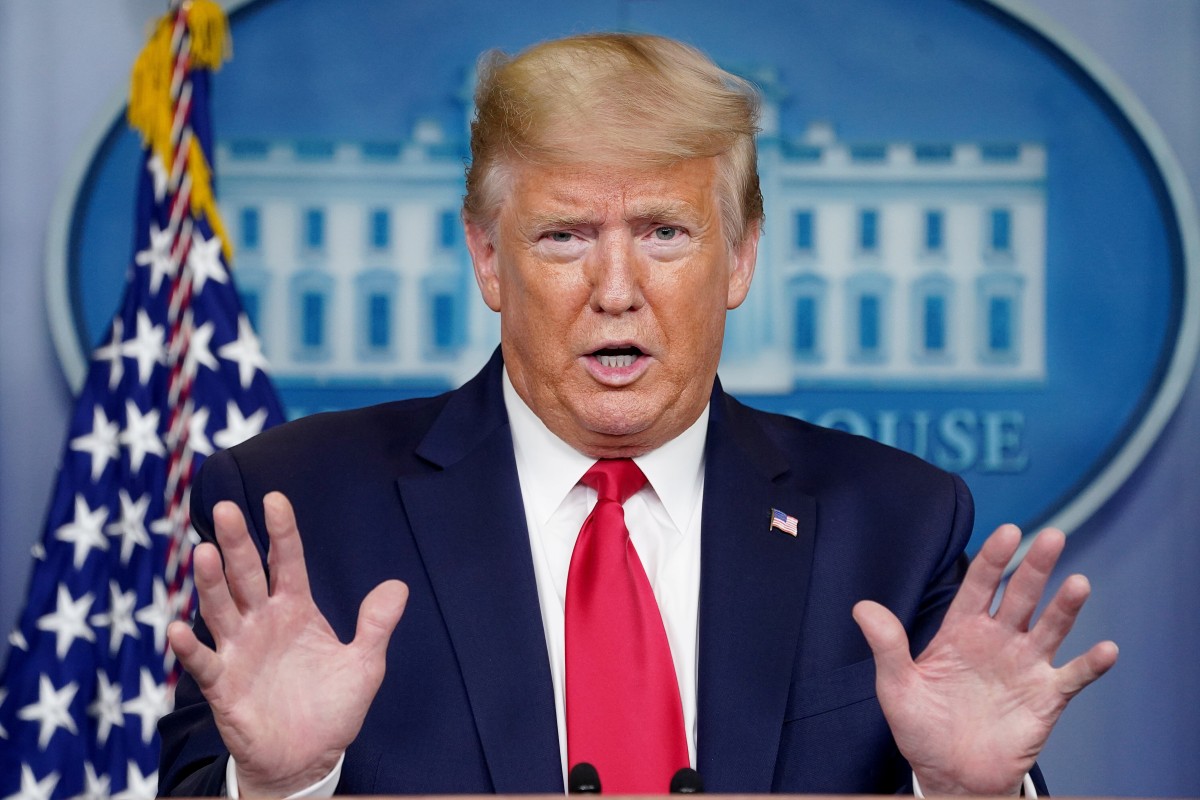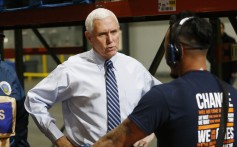At his daily briefing, the president focuses on how Washington gave the agency US$452 million in funding last year compared with China’s US$42 million
He also accused the agency of stating on January 14 that the coronavirus was not transmissible from human to human
Mark Magnier Published: 9 Apr, 2020 SCMP

US President Donald Trump speaks on Wednesday at the coronavirus task force briefing at the White House. Photo: Reuters
US President Donald Trump redoubled his attack on the World Health Organisation on Wednesday, suggesting that the United States wasn’t getting its money’s worth and threatening to investigate the UN agency.
Trump did not provide details about any proposed investigation, instead focusing on how Washington provided US$452 million in funding last year compared with China’s US$42 million.
He also accused the agency of stating on January 14 that the coronavirus was not transmissible from human to human – at the time that was the scientific consensus, although this was later proven inaccurate – and slammed the WHO for criticising his decision to block flights from China.
“We're going to study an investigation and we're going to make a determination,” Trump said at a daily White House press briefing. “In many ways they were wrong. They also minimised the threat.”
Trump administration officials have repeated several of these talking points in recent days, pointing the finger at the WHO amid mounting evidence that top officials in Washington were aware of the threat weeks before crisis managers kicked into gear.
As late as February 28, Trump referred to the attention being given to the pandemic as a “hoax” propagated by political enemies and the media.
Trump, who has a history of deflecting blame, also faces some modest slippage in recent opinion polls, something he watches closely. A CNN poll released on Wednesday reported that 52 per cent of those surveyed disapproved of Trump’s actions during the crisis, up from 48 per cent since early March. And an ABC News/Ipsos poll released Friday showed a similar trend.
The White House’s proposed budget for 2021 cuts the US contribution to the WHO significantly, from US$122 million to under US$58 million, though the final decision belongs to Congress.
Earlier on Wednesday, WHO director general Tedros Adhanom Ghebreyesus criticised the US for politicising the pandemic.
Pence tries to blame China and own US health agency for slow response to contagion
2 Apr 2020

“We don’t do politics at WHO,” he said. “We care for the poor. We care for those who are vulnerable.”
United Nations Secretary General Antonio Guterres lent his support too, saying it was not the time to criticise the early response to the outbreak.
“Now is the time for unity, for the international community to work together in solidarity to stop this virus and its shattering consequences,” he said in a statement.
The UK government has also backed the WHO, and there were no plans to review its funding for the world health body.
“The UK supports the role that the WHO is playing in co-ordinating the global health response to the pandemic,” said a spokesman for UK Prime Minister Boris Johnson, according to The Times.
The WHO has come under criticism in Washington for underplaying the extent of the pandemic in China in January and February and for not allowing Taiwan into health strategy meetings under pressure from Beijing, which considers it a renegade province.
Trump expressed his satisfaction with recent predictions that the US might see 60,000 deaths by August, down from earlier models that suggested as many as 250,000 deaths, citing his administration’s ongoing drive to “beat the virus, to crush the virus, and it’s happening”.
Blaming China for the coronavirus will come back to haunt the West
2 Apr 2020

With some evidence of progress, the president repeated his desire to see the US economy rev back up as soon as possible, although he said he would take the advice of healthcare experts before any decision.
“We’re heading toward a final stretch, the light at the end of the tunnel,” he said. “We have to get our country back and we have to get going.”
Dr Deborah Birx, the White House coronavirus task force coordinator, said this was largely because the public has modified its behaviour, remained at home and maintained enough distance from each another in public to slow transmission of the virus.
“We are impressed by the American people” she said, even as she cited several tough weeks ahead and urged people not to become complacent.
Additional reporting by Agence France-Presse

Mark Magnier is a US correspondent based in Washington. Before joining the Post, he worked for the Wall Street Journal in China and for the Los Angeles Times in India, China and Japan. He’s covered the Chinese economy, China and India’s explosive rise and conflicts in Iraq, Pakistan and Afghanistan.
No comments:
Post a Comment